Guizhou Travel Guide
Guizhou Travel Guide
Located in southwest China, this province adjoins Sichuan and Chongqing to the north, Yunnan to the west, Guangxi to the south and Hunan to the east. It is a picturesque place with abundant natural and cultural scenic spots. Many Chinese ethnic minorities have been living on this land for centuries. Visitors to that area can not only appreciate various attractions, but also discover the rich and distinctive folk customs and cultures of the different ethnic groups.
Landscape & Climate
Landscapes in this province are broadly divided in to four types: plateaus, mountains, hills and basins. Among them, mountains and hills predominate. In addition, karst landforms are distributed widely on this land, which accounts for 61.9% of the province’s whole territory and forms a special Karst ecosystem. Due to these rugged landscapes, its development level is low, especially in the rural areas. However, it is these varied landscapes that hide an abundance of amazing and unique natural scenery, like Huangguoshu Waterfall, Dragon Palace Cave, Zhijin Cave and Danxia Landform. The Danxia Landform is listed as a UNESCO World Cultural & Natural Heritage. Guizhou has a subtropical humid monsoon climate, which is frequently cloudy and rainy. There are few seasonal changes here with the result that it is neither too cold in the winter nor too hot in the summer. As a whole, people here enjoy a pleasant climate. Its capital city, Guiyang, is considered a ‘world’s summer resort’ because of the moderate temperature.
Ethnic Groups
This province is home to 48 China’s ethnic groups, second only to Yunnan Province, each of which has developed their own unique customs and cultures. When traveling there, visitors should not miss the chance to experience their simple and original living habits, appreciate the unique architectural styles and try their exotic and colorful costumes, etc. For example, one can go to Langdeshang Miao Village or Xijiangqianhu Miao Village to admire their stilt-houses and colorful traditional clothes; to China’s last gunmen’s tribe, Basha Miao Village, to experience their unique life styles; to Buyi Stone Village to explore how this stone village was made without any other construction materials; to Dong villages to see Dong-style drum towers and wind-rain bridges, etc. What’s more, over 1,000 festivals are celebrated by ethnic groups each year in Guizhou, providing the best opportunities for visitors to experience these ethnic traditions. The most famous festivals include Sanyuesan Festival and Sister’s Meal Festival in the spring, Liuyueliu Festival in summer, and the Shui New Year Festival in autumn.
Delicacies & Specialties
Food there mainly consists of Qian cuisine and local snacks. Hot, spicy and sour are the three most featured flavors of Qian cuisine. The most famous dishes include Suan Tang Yu (Sour Soup Fish) and griddle cooked dishes. Well-known snacks include Chang Wang Noodle, Lian’ai Doufu Guo and Si Wa Wa. Another Guizhou specialty is Maotai Liquor, which is considered the national liquor of China national liquor and one of the world’s three best distilled liquors along with whisky from the United Kingdom and French brandy. Rice wine made by local farmers is also a famous specialty. The area is also famous for its batik fabrics, silver decorations of the ethnic groups, bacon and Chinese medicine.
Tourist Attraction

Huangguoshu Waterfall
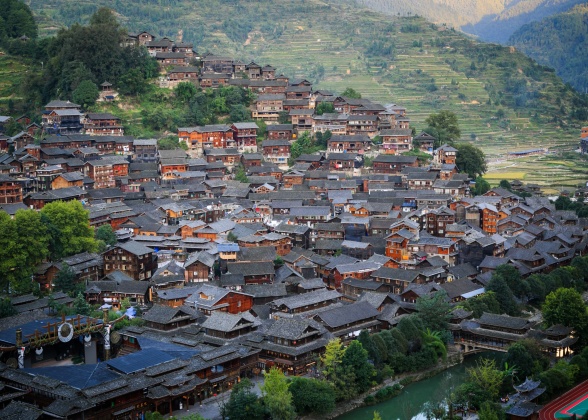
Xijiang Thousand-Household Miao Village
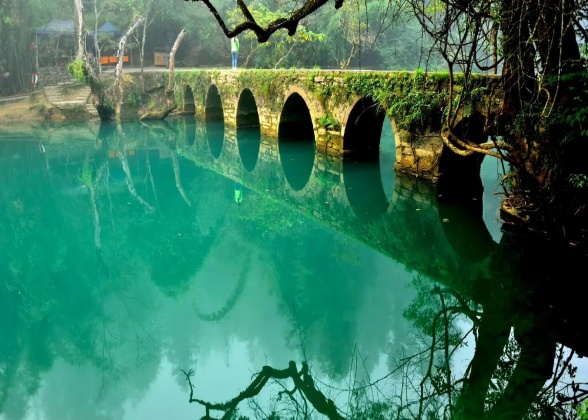
Liupo Small Seven Holes
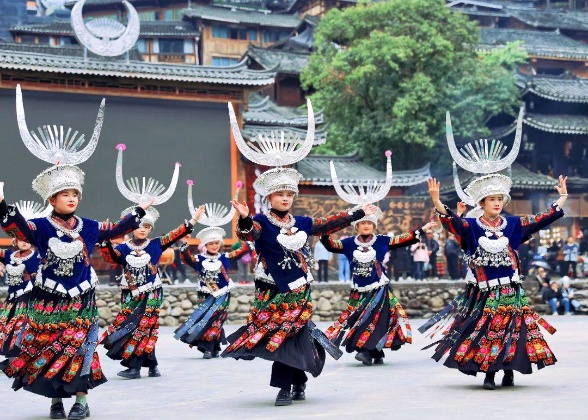
Langde Miao Village
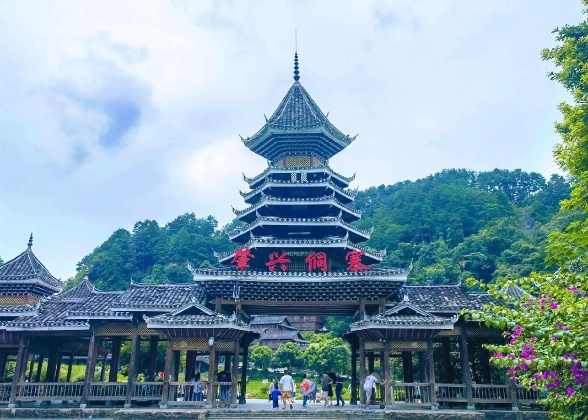
Zhaoxing Dong Village

Guizhou Maotai Distillery

Transportation
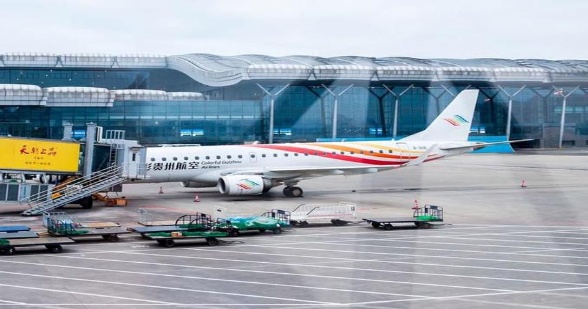
Airport Code: KWE
Location: Approximately 7 miles (11 kilometers) east of downtown Guiyang
Overview: Guiyang Longdongbao International Airport opened in 1997 and began operating as an international airport in 2006. The airport features two terminals: Terminal 1 serves international flights, while Terminal 2 handles domestic flights. Currently, the airport operates over 110 routes connecting numerous cities including Beijing, Hangzhou, Xi’an, Nanjing, Hong Kong, and Taiwan.
Airport Hotline: +86 0851 96967
Airport Transportation: City buses, 5 shuttle bus routes, high-speed trains to Longdongbao Railway Station, and long-distance coaches to surrounding cities such as Bijie, Anshun, and Zunyi.
Meals
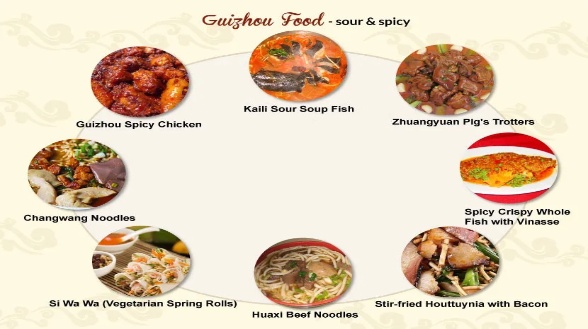
Guizhou cuisine and local snacks are the main offerings. Guizhou dishes are characterized by their sour, spicy, and hot flavors. The most famous dishes include sour soup fish and dry pot, while renowned snacks include intestine and blood noodles, love tofu hotpot, and silk wrappers. Another major Guizhou specialty is Maotai liquor, China’s national spirit. Ranked among the world’s top three distilled spirits alongside British whisky and French brandy, it stands alongside locally brewed rice wine as a renowned regional product. The area is also celebrated for its wax-print textiles, ethnic silver jewelry, cured pork, and traditional Chinese medicine.
Ethnic Group
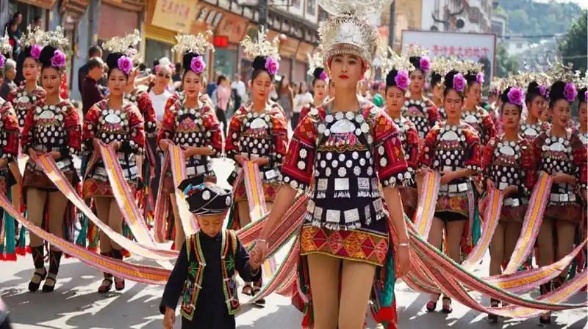
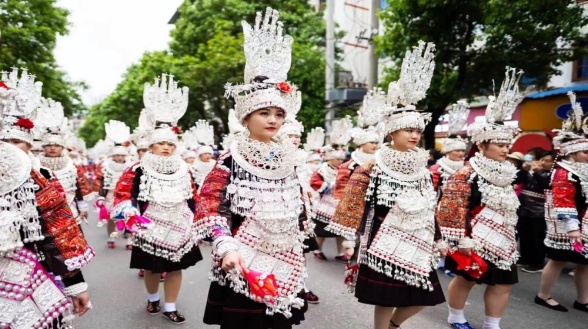
Guizhou Province is China’s second-largest ethnic minority region, home to 48 distinct ethnic groups, each with its own unique customs and culture. When visiting Guizhou, travelers shouldn’t miss opportunities to experience their simple, traditional lifestyles, admire distinctive architectural styles, and try on their vibrant, exotic attire. For instance, visit Langde Upper Miao Village or Xijiang Thousand-Household Miao Village to see their stilted houses and colorful traditional costumes; visit the Bashi Miao Village, home to China’s last gun-toting tribe, to experience their distinctive way of life; explore the Buyi Stone Village to discover how this settlement was built using only stone; and visit Dong villages to see their drum towers and wind-rain bridges. Additionally, Guizhou hosts over 1,000 ethnic festivals annually, offering visitors prime opportunities to immerse themselves in these traditional celebrations.
Start planning your customized tour with one-on-one help from one of our travel consultants.
Why Choose 365 China Travel
★Customize your tour
Travel Advisor with roots in China
Immediate response, no waiting!
Direct Connections, Supreme Values
★Maximize your flexibility
- Your own private guide and journey
Explore at your own pace
- Unparalleled flexibility, not possible with group tours
★Ensuring Your Satisfaction
Top 20% of nationally ranked tour guides at your service
24/7 emergency support
Cultural In-depth Experience Service
